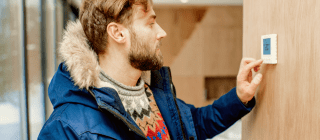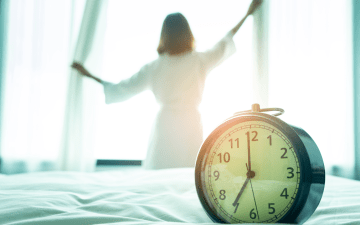Tips for Healthy Home Heating

Our heating systems can cause poor indoor air quality and unsafe situations. Learn some tips to keep your home warm and healthy.
It’s heating season again here in Vermont. The nights have gotten cold enough that most Vermonters have turned on their home’s heating system. But is that newly active heating system harming your health?
Dust, mold, and other allergens circulating through heating systems can trigger allergy symptoms. Poor indoor air quality can cause stuffed up noses, sore throats, headaches, and fatigue. Heating systems can also dry out air, leading to skin problems, eye irritation, and increased risk of infections. Malfunctioning heating systems can cause respiratory problems or even be deadly.
You can take action to ensure your home’s heating system isn’t harming your health. We’ll give you some steps to take and tips for heating your home safely.
Setting the Thermostat
One of the biggest debates in home heating is what temperature to set the thermostat on. Some people like their home to be toasty warm, while others prefer cooler settings to save money on energy.
In the winter, most people should set their thermostat at 68 degrees Fahrenheit when they’re home. That’s a sweet spot, balancing comfort with cost savings. Your furnace won’t have to run as often to maintain an indoor temperature of 68 degrees, and many people can stay comfortable at that temperature by wearing a sweater or sweatshirt.
If anyone in your household is very young, elderly, or has a chronic health condition, they may need the temperature to be warmer than 68 degrees to prevent getting sick. However, don’t set the indoor temperature above 72 degrees in winter, as that can make your furnace work harder and dry out the air too much.
Setting the temperature too low can cause health problems too. If the indoor temperature drops below 63 degrees, it can increase blood pressure as your body tries to stay warm. Older people are at greater risk of hypothermia if a home is too cold. Lower temperatures also increase condensation on windows in winter, which can lead to mold and mildew growth.
Should you keep your indoor air temperature steady throughout the day, or should you lower it at certain times, such as when you’re away from home? The answer depends on personal preferences, but here are a few points to consider:
- Keeping indoor temperature steady means your furnace won’t have to run for a lengthy time to get your house back up to a comfortable temperature when you return home. For certain heat pump models, consistent temperature is more efficient. Maintaining a steady temperature also reduces the likelihood of moisture problems, as it keeps cold spots from forming where warmer air can condense and release water droplets.
- Lowering the temperature setting by 7 to 10 degrees when you’re away from home for eight hours or more means you can save up to 10% on heating bills annually. Reducing the indoor temperature by a few degrees at night may also help you sleep better. Your body temperature decreases as you prepare for sleep, so a slightly cooler room supports that natural process. Cooler room temperatures help you get to sleep faster and stay asleep longer.
Indoor Air Quality
During the winter, the quality of the air inside your home can be greatly affected by your home’s heating system. Pollutants can get trapped inside and become concentrated, leading to eye and respiratory irritation. Heating can dry out the air inside your home, also making you feel uncomfortable. Here are some things you can do to improve your indoor air quality in the winter and protect your health.
- Change air filters regularly. If you have a forced air heating system, it most likely will have an air filter. Be sure to change the filter at least once every 90 days. Many filters have a MERV rating number, which is on a scale of 1 to 20. The higher the number, the greater its ability to capture tiny particles and remove pollutants from the air. Filters with higher MERV numbers also make the furnace work harder to pull air through them. A MERV 11 filter is a good choice for homeowners with pets and allergies. If you want to use a MERV 13 filter or higher, be sure to check your heating system’s specifications first to see if it can handle the increased resistance.
- Get your heating system serviced. Make sure your heating system is in good working order at the start of the heating season by having it serviced by a trained professional. In addition to removing soot and debris, they can check to make sure the equipment is not emitting any pollutants or dangerous gasses like carbon monoxide. If you have a woodstove or fireplace, have the chimney cleaned and inspected.
- Monitor humidity levels. Place a digital hygrometer in several areas of your home to monitor humidity levels. It’s a good idea to have at least one hygrometer on every level of the home, including the basement. They are inexpensive, with models available at hardware stores and online for about $10 each. A humidity level between 30% and 50% is desirable. If the humidity drops below 30%, you should use a humidifier to add more moisture into the air, which will prevent issues like dry skin and irritated sinuses. Consider using a dehumidifier to remove moisture if the humidity level rises above 50%, to prevent possible mold and mildew growth. Run a bathroom exhaust fan when taking a shower to control humidity levels there.
- Burn only seasoned wood. If you use a fireplace or a woodstove in the winter, be sure to only burn dry, seasoned hardwood. It burns hotter and produces less smoke. Burning wood that is “green” and has too much moisture in it can produce thick smoke that contains pollutants and irritants. Wood that hasn’t been dried sufficiently can also contain mold and mildew, which is released into the air when you bring the wood into your home. Don’t burn wood unless it has been dried outdoors for at least six months or has a moisture content of less than 20%. You can check the moisture content with a wood moisture meter, available for less than $50.
- Clean regularly in winter. Dusting and vacuuming frequently in the colder months will help remove allergens that can make you sick. Be sure to clean registers, vents, baseboards, and radiators often as they tend to collect dust as air passes through them. Avoid using strong cleaning solutions that can emit chemicals into your indoor air.
- Let fresh air in. Ventilate your home periodically during the winter by opening a window or two for short periods on warmer days. You may cringe at the thought of heat escaping, but letting some fresh air in will help you keep your indoor air quality healthy.
Heating Safety Tips
Protect your and your family’s health by following these heating safety tips:
- Use space heaters correctly. Space heaters can be the source of fires if not used properly. Place a space heater on a level, hard and nonflammable surface like a tile floor. Don’t put them on rugs or carpets. Keep at least three feet of clear space around them and don’t place them near bedding or drapes. Never leave a space heater unattended when in use — turn it off when you leave the room or go to sleep. Plug electric space heaters directly into outlets, don’t use extension cords.
- Don’t use an oven for heat. Only use an oven or stove for cooking, never to heat your home as they are not designed for that purpose and lack proper ventilation.
- Don’t leave fires burning in fireplaces. Never leave a fire in a fireplace unattended, as sparks could ignite nearby furnishings. Make sure any embers are completely out before going to bed or leaving home. When removing ashes, use a metal bucket with a lid. Check to be sure the ashes are cold before dumping them outside away from your house or other buildings.
- Install and test smoke and carbon monoxide alarms. Most heating systems can emit deadly carbon monoxide (CO) if they malfunction. Detectors can alert you to the presence of CO gas, which is colorless and odorless, giving you time to escape. Install at least one smoke and CO detector on every level of your home, especially near bedrooms so the alarm will wake up anyone who is sleeping. Periodically push the test button on each detector to make sure it is working properly.
Stay Warm and Safe This Winter
As Vermonters, we rely on our home heating systems to keep us warm during the colder months. However, these systems can be harmful to our health if they are not regularly maintained and used properly. Following the tips in this article will ensure that you and your family will remain comfortable and safe this winter.



